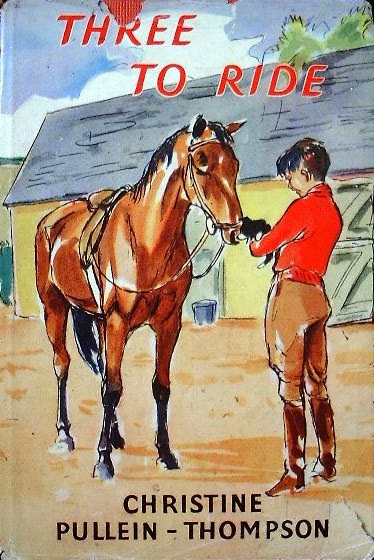I've covered a few of Christine Pullein-Thompson's books in this series, but not written much about the author herself.
Christine Pullein-Thompson (1925-2005) was the most prolific
Pullein-Thompson sister by far, and to date is the British author with most
pony books to her name. If you are wondering who's in line to overtake her, my money's on Jenny Oldfield, who has produced a phenomenal number of books, pony and not.
Christine's bibliography (which you can see in full on my website) numbers over 100 titles, which
range from non-fiction to early readers and children’s adventure stories, and,
of course, pony stories.
 |
| Burke, 1959, 1st edn, illus Sheila Rose |
Christine's mother was the author Joanna Cannan, and her sisters the pony book authors Diana and Josephine. All three sisters had their own particular take on the pony book. Christine's twin, Diana, wrote mostly about children who were solitary, Josephine went for large families, and Christine had a mixture of both.
 |
| Dragon, 1960s, pb, cover Mary Gernat |
When the twins were very young, they were welded together, sharing a common language and much else, so much so that they worried their mother. She decided to separate them; Christine remaining in the family house in Wimbledon and Diana being sent to Oxford to stay with their mother and an aunt. Diana “sank into lethargy and silence, while at home Christine uttered not a word.” They were reunited.
The twins suffered when separated, but as they grew older, wanted to be individuals. Christine remembered choosing a small cake instead of the ice cream her sisters wanted, although she wanted an ice cream just as much. She said “I believe it was my first small step in wishing to be an individual rather than just one of the twins. This feeling has never left me.”
 |
| Dragon, 1973, pb |
 |
| Dragon, 1970s, pb |
David and Pat, the hero and heroine of the First Rosette series, both have to learn how to make their own way in life. David has to do things on his own. He's stepped outside his working class background, and entered the world of the horse. Pat, with whom he starts a riding school, has had a conventional middle class upbringing, and goes on to do what's expected of her, despite what it does to their riding school business - she becomes a deb.
David, meanwhile, decides to leave his very good job for one in London, and it's a disaster. It's only due to the fantastic coincidence of meeting Pat in London that he and his horse are saved. It's interesting to see the characters learning as they go, and the series is a much more satisfying one than some of Christine's earlier books, which relied on frantic adventure: David and Pat, like Christine, were taking their first small steps in being an individual.
~ 0 ~





Comments